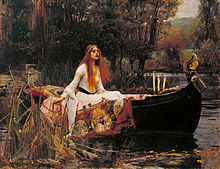lady
Lady ( English [ ˈlɛɪ̯di ] lady , from Old English hlæfdige actually "bread kneader, bread maker") originally referred to a noble or noble woman. Lady is in the UK , the salutation for the wife of a lord , a Knights (Ritter) or baronet , in certain cases, for the daughters of peers (see courtesy title ) or for a Peeress own right. It used to be the title of Queen and Princesses of England . The male variant is Lord or Sir .
Later, like gentleman , the term was used especially in the plural for all stalls (for example in the salutation "[Dear] Ladies and Gentlemen" or in the form of gender designations on toilet doors). The singular term is now also used in the English language for a polite - sometimes old-fashioned - form of address for a woman in general.
etymology
In English , Lady (English lady , mengl. Lavedi , aengl . Hlǣfdīge 'house lady , castle lady , queen', actually 'bread kneader', later 'mistress whose bread one eats') is used as the title or salutation of a noble woman, but also used for woman or lady in general. It is a composition of aengl. hlāf 'bread' (cf. loaf ) with a basic word probably derived from the ancient Germanic * deigjōn 'dough kneader', which like aengl. dǣge 'kneader of (bread) dough, baker' is formed in ancient Germanic * digan 'knead' (compare dough ). In German, the term lady was introduced in the 18th century, and in the 19th century also in the form of attributes such as ladylike ('after the manner of a lady'). In the 20th century, the name First Lady was established in German from American English .
In English, Lady is also a title for the mother of Jesus Mary , for example in the form "(Our) Lady's". It is used for church holidays such as Lady Day ( proclamation of the Lord ) or for animal, plant or place names. A well-known example is ladybug or ladybird for the ladybug .
Individual evidence
- ^ Brockhaus' Kleines Konversations-Lexikon. 5th edition. Volume 2, Leipzig 1911, p. 5 ( Lady on zeno.org).
- ^ Herder's Conversations Lexicon . Volume 3. Freiburg im Breisgau 1855, p. 686 ( Lady on zeno.org).
- ^ Cambridge University Press : lady. In Cambridge Dictionary. Accessed May 7, 2018.
- ↑ Lady. In: Digital dictionary of the German language . Retrieved April 7, 2020
- ↑ lady. In Online Etymology Dictionary. Retrieved May 27, 2018.
